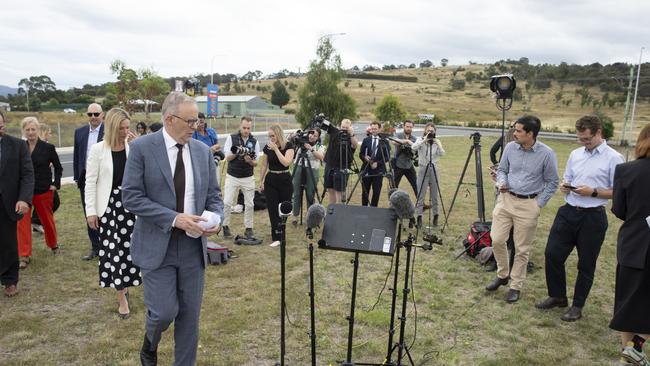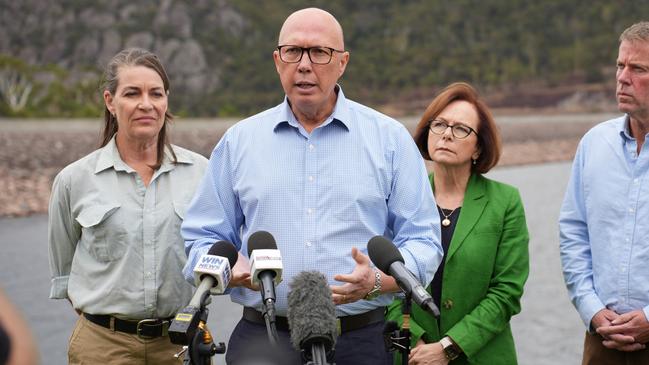
“We should have four-year fixed terms,” Anthony Albanese told the Seven Network’s Sunrise program.
By week’s end the discussion had died a horrible death. Both the Prime Minister and Peter Dutton have indicated support for fixed four-year terms at various times although last week, Dutton dismissed the PM’s advocacy as a distraction.
The shift to fixed terms would require a referendum and bipartisan support if it has any chance of winning over the Australian people. Like it or not, that can has been kicked down the road.
Albanese, having committed his government to run its full term, has taken all the fun out of predicting an election date.
Our states and territories now all have fixed parliamentary terms. It is only in the federal system where the Prime Minister selects the date on which we scratch away at ballot papers with the nubs of pencils.
Knowing the timing of an election provides a few benefits to sitting governments. They can and do step up government advertising campaigns that will run until caretaker provisions kick in.
An election in mid-May is likely, thus the last sitting day of the parliament will probably be on April 17. The PM has the opportunity of asking his Treasurer to bring forward a budget in April and, for a few days at least, driving the political rhetoric.
Fixed terms will not fix the problem of interminable ersatz campaigning.
With the new year barely a fortnight old, Albanese and Dutton have begun traversing the country, all paid for by the taxpayer, as opposed to a real campaign where the parties are required to fund their own expenses. Both men are engaged in what is referred to in the media as “soft” campaign launches, a Claytons – or, perhaps with an eye to a more contemporary cultural reference – zero alcohol beer campaign before the parliament is dissolved and the battle moves to the top shelf.
Earlier this week, the Prime Minister had the cheque book out, pledging $3bn on upgrades to the NBN’s fibre-to-the-node, which the PM says will deliver access to higher internet speeds for around 622,000 additional premises, with the upgrades delivered by 2030.
According to SpeedTest, Australia ranks 22nd in mobile broadband speeds while nudging Uzbekistan out for 75th place in fixed broadband speeds. Take that, Central Asia.
The NBN remains deeply unloved, especially in regional Australia. Fibre to the node is often unusable due to degraded copper telephone lines sometimes installed more than a century ago, combined with the location of nodes, often as far as a kilometre away from internet- poor households.
Regardless, the announcement was something of a damp squib given the $3bn injection is an expansion of existing government policy where $2.4 billion has been set aside to increase the number of homes which enjoy fibre to the premises.
Softly launching, too, was the Opposition Leader, who is pushing a tough-on-crime agenda that implicitly taps into concerns that are widely held across the country concerning immigration rates.
Dutton faces something of a dilemma. He is trying to soften his image while talking tough on immigration, crime and the cost of living. A fine balancing act will be required.
On Tuesday, Dutton was in Aston in Melbourne’s eastern suburbs and met with a victims-of-crime group. Aston was the scene of the April 1, 2023 by-election, where the Liberals lost what was considered a safe seat with a swing against it of 6.4 per cent, two-party preferred.
This was the nadir for the Coalition and if anyone had said then that a Dutton-led Coalition would triumph in 2025, they would have been frogmarched away for intensive psychotherapy. It has only been Dutton’s ruthless focus on the failings of the Albanese government that has put the Coalition back in the game.
Long formal campaigns are seen as a drag on incumbents. The longest formal election campaign in recent times was in 2016 when Malcolm Turnbull pulled a double dissolution trigger.

After visiting the Governor-General on May 8, parliament was dissolved and an election called for July 2, an exhausting period of 55 days on the hustings ensued, almost a fortnight longer than any other federal election campaign in the past 20 years.
The Coalition lost 14 seats and skated as close as a government can to minority government. Malcolm Turnbull had squandered his political capital and brought Labor back to within a stone’s throw of parking their backsides on the Treasury benches. By 2018, the rug was pulled on Turnbull by his own party room.
There’s not much to be said about short election campaigns for sitting governments, either. The shortest formal election campaign in the past two decades was Labor’s death march to the ballot box in 2013, where Kevin Rudd was reinstated by the Labor caucus to save the furniture.
A few wonky chairs and some occasional tables might have been spared, metaphorically speaking, but after a rapid campaign of just 33 days, the Rudd Labor government lost 17 seats and the keys to the Treasury benches. If nothing else, it proved that when the people have reached for the baseball bats, the game is up and timing is almost irrelevant.
One big difference between how the two current political leaders campaign is soon to emerge. The Prime Minister retained his inner Sydney seat of Grayndler in 2022 without having to go to preferences. However, the Opposition Leader’s seat, Dickson, is the most marginal Coalition-held seat in Queensland. The Australian understands that a teal independent candidate for Dickson will be announced on January 27. Labor has preselected Ali France to have a third crack at Dutton.
A teal candidate should expect to struggle for votes in the sprawl of Brisbane’s suburbs in the northwest, but the mere presence of a third-party candidate who might pinch votes from the LNP side of the ledger muddies the waters and means Dutton must spend more time in his own electorate, which will be another balancing act.
The fake election campaign has begun. In truth it probably has never ended, merely intensifying in an election year while the clock runs on a Prime Minister who has few benefits of incumbency left to him.







Last week, fixed four-year parliamentary terms in the federal sphere were briefly back on the agenda.